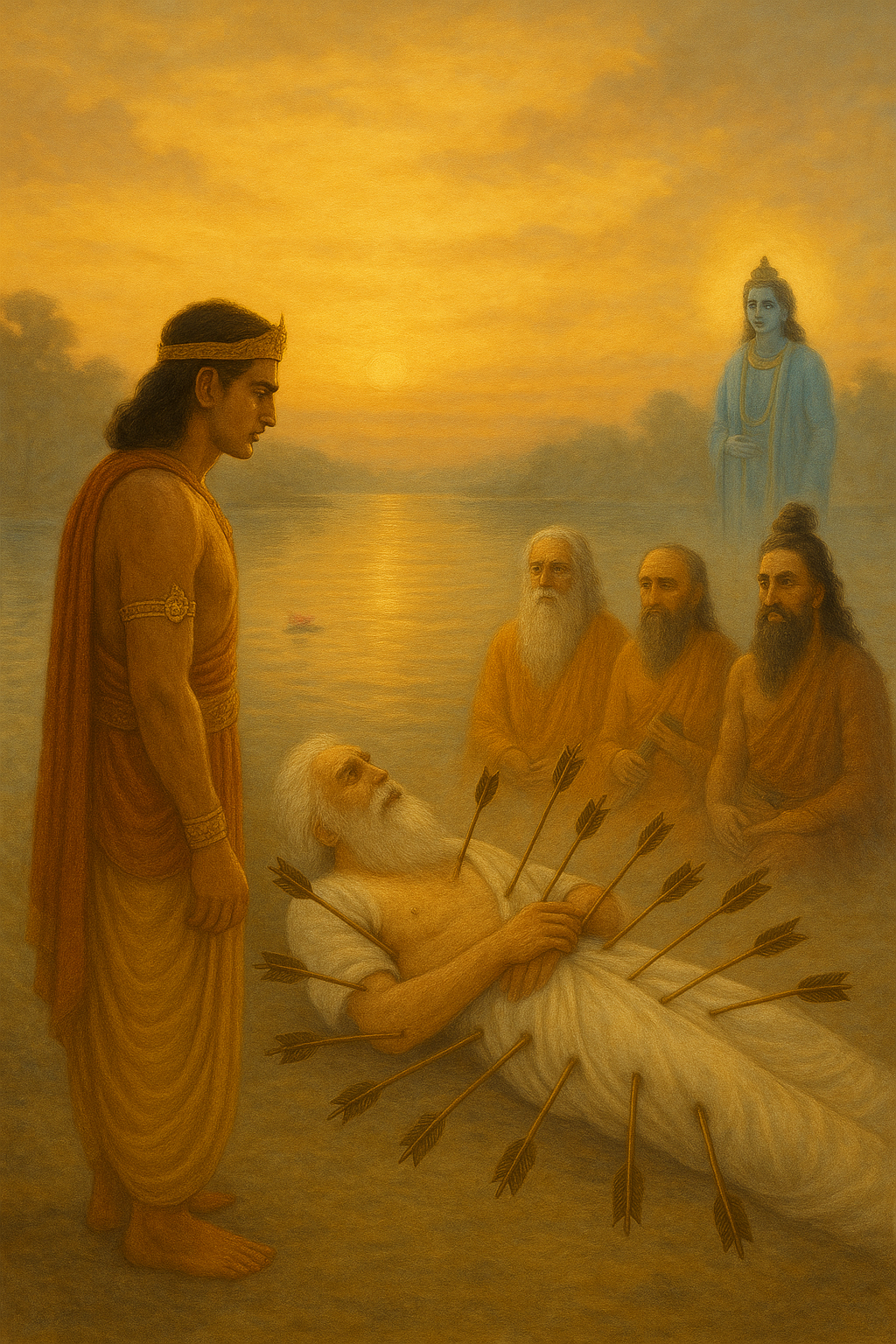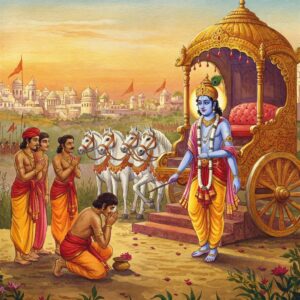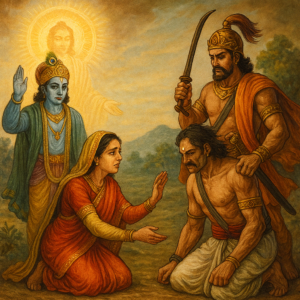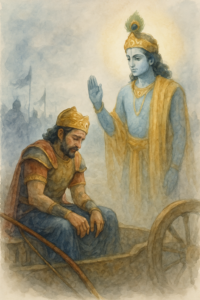Imagine achieving everything you worked for, only to be haunted by guilt and sorrow so profound that success feels like a burden. In today’s fast-paced world, many of us grapple with similar feelings—a career milestone overshadowed by personal sacrifices, a hard decision tainted by its emotional toll.
This is the story of Yudhishthira after the Kurukshetra War, where triumph came at the cost of unimaginable loss. Overwhelmed by grief, the righteous king questioned his every action, weighed down by the bloodshed caused in the name of Dharma.
But what happens when grief meets divine wisdom? How does one reconcile personal guilt with the responsibilities of leadership?
Join Yudhishthira on his pilgrimage to Bhishma Pitamah—the wise grandsire who, from his bed of arrows, shares timeless lessons on duty, forgiveness, and the greater plan of the Divine. This story isn’t just about ancient heroes; it resonates deeply with the choices we face today, urging us to navigate our inner struggles with clarity, compassion, and purpose.
Curious to discover how Yudhishthira rose above his despair to lead with justice and strength? Read on to uncover insights that are as relevant in the modern world as they were thousands of years ago.
Yudhishthira’s grief after Kurukshetra War
After the great war of Kurukshetra, Hastinapura stood silent, bearing the weight of its sorrows. Though victory had been achieved, King Yudhishthira was consumed by an overwhelming grief. The relentless images of slain kinsmen haunted him. Neither the wise counsel of sages nor the divine companionship of Lord Krishna could ease his torment. His sorrow seemed to transcend even the voice of Dharma itself.
Yudhishthira, the paragon of virtue, felt the profound guilt of a brother who survived while others fell. He lamented, “I have betrayed my kin, the Brahmins, and even my Guru. Sacrifices and penance cannot cleanse the sins I’ve accrued from this river of blood. Just as muddy water cannot purify itself, so too, no rites can absolve me.”
His profound anguish set the tone for the journey ahead—a spiritual pilgrimage to seek solace from one who lay suspended between life and death: Bhishma Pitamah, the revered grandsire of the Kuru dynasty.
The Pilgrimage to Bhishma Pitamah
Accompanied by his brothers, and Lord Krishna, Yudhishthira arrived at the banks of the Ganges. There lay Bhishma Pitamah, on a bed of arrows, awaiting his departure at the auspicious time of Uttarayana. Around him gathered celestial sages and divine beings: Parashurama, Ved Vyasa, Narada Muni, and others. Upon seeing the Pandavas, tears of both sorrow and joy flowed from Bhishma Pitamah’s eyes.
“Oh, sons of Pandu,” he said, “you have suffered deeply despite your righteousness. From your father’s untimely death to the injustices at the Kuru court, life has tested your virtue time and again. Yet, Dharma has not abandoned you, for Lord Krishna Himself stands with you. Let me share the wisdom of the ages so your heart, Yudhishthira, may find peace.”
Krishna: The Eternal Witness
As Bhishma Pitamah addressed Yudhishthira’s guilt, he reminded him of Lord Krishna’s divine role. “Sri Krishna, who you call friend, brother and charioteer, is the Supreme Being. In times of despair, He guides, protects, and fulfills every duty beyond mortal comprehension. He orchestrates events, ensuring that Dharma is upheld, even if the path is shrouded in suffering.”
Bhishma Pitamah’s reflections on Shree Krishna’s past deeds illuminated the Lord’s divine will. He spoke of how Shree Krishna had consoled Arjuna on the battlefield, transforming his despair with the timeless wisdom of the Bhagavad Gita. He described the moment Krishna, breaking His vow not to fight, charged towards Bhishma himself, wielding a chariot wheel like a thunderbolt. “That moment,” Bhishma Pitamah recounted with reverence, “made the universe tremble, yet it was filled with His love for me. He did so because I wanted to break his vow. This is Krishna’s love for his devotees. Surrender to His will, Yudhishthira, and you will find freedom from your sorrow.”
The Nature of Dharma
Bhishma Pitamah delved deep into the mysteries of Dharma, explaining its nuanced and often paradoxical nature. He revealed that Dharma is not rigid; it shifts with context, requiring both wisdom and compassion. Yudhishthira’s actions in war were guided by duty to protect the people and uphold righteousness, actions sanctioned by Dharma.
Yet Bhishma Pitamah did not dismiss Yudhishthira’s remorse. “Your grief,” he said, “is not weakness but a reflection of your pure heart. Even the righteous must wrestle with their conscience to understand the greater truths. Accept your role as king; serve your people and fulfill your responsibilities. Through selfless action, you will honor those who have fallen.”
Bhishma Pitamah’s Final Moments
As the auspicious time of Uttarayana approached, Bhishma Pitamah turned his gaze to Lord Krishna. His voice softened as he recited verses of devotion. “In you, Krishna, lies the refuge of all creation. It is my fortune to depart with Your form before me. To You, I surrender my soul.”
With this, Bhishma focused his mind entirely on Krishna and left his mortal coil. Silence enveloped the atmosphere, and even the waters of the Ganges seemed to pause in reverence. Bhishma Pitamah’s life had ended, but his teachings on Dharma and devotion became eternal.
The Aftermath: Resuming Duties in Grief
Guided by Krishna’s counsel and the wisdom imparted by Bhishma Pitamah, Yudhishthira took up his role as the ruler of Hastinapura. Though burdened by the loss of his kin, he channeled his sorrow into just governance. As king, he became the protector of his people, embodying the balance of justice and compassion Bhishma had described.
Krishna’s presence underscored this transition, reminding Yudhishthira and the world that life’s trials, no matter how profound, are orchestrated within the realm of divine grace.
Relevance Today
In today’s world, Yudhishthira’s journey reflects the challenges of leadership, ethical dilemmas, and personal guilt. Just as Yudhishthira was reminded to embrace his responsibilities despite his grief, individuals today must navigate their roles with integrity even amid emotional trials. Whether it is making difficult decisions at work or reconciling personal losses, the teachings of Dharma—of balance, compassion, and action—remain timeless.
Bhishma Pitamah’s reminder to seek wisdom and Shree Krishna’s assurance of divine guidance inspire us to rise above despair and trust in a greater purpose.
This tale—of grief, guidance, and acceptance—reminds us that life’s greatest battles are often within, and through devotion, duty, and wisdom, we can emerge victorious.



